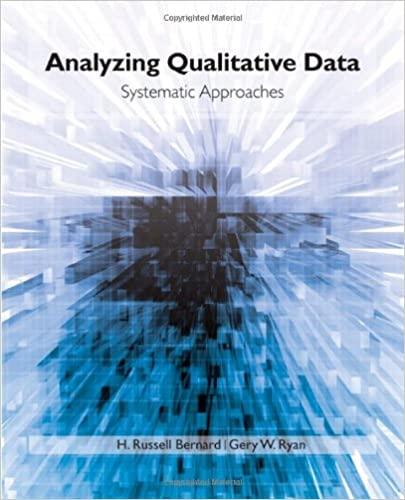Question
Marshal, Sasha, and Ian are students in Alex's 7 th -grade math class. As the teacher, Alex recognizes that many middle school students experience reduced
Marshal, Sasha, and Ian are students in Alex's 7th-grade math class. As the teacher, Alex recognizes that many middle school students experience reduced motivation for academics and are highly influenced by their social groups. Alex is looking for ways to increase student motivation.
Marshal hates math. When he comes into Alex's class each morning, he scowls, plops down into his seat, and crosses his arms. Marshal feels that he's never been successful with math, and he doesn't see the point in trying. He was placed in remedial math programs twice in elementary school. He knows that he's good at some things, like sports and creative writing, but math is not a subject that he thinks he can do well. He plans to be a professional soccer player, so he doesn't really see the point in working hard to improve his math skills.
Sasha, on the other hand, enjoys math class more than any of her other classes. She has always done well in math, even when she's had to work hard to understand the concepts, and she enjoys the challenge. She comes to class with her notebook and takes notes when Alex presents new concepts. She reviews her notes on the bus most afternoons, and she always studies before tests because she believes that it's her hard work that makes her successful. When Sasha does well on a math test or can help her friends learn the material, she feels proud of the work that she puts into her learning. Sasha doesn't find math easy, per se, but she knows that she can do well. She hopes to be a math teacher in the future, so she challenges herself to understand the concepts fully.
Ian and Sasha have been neighbors since kindergarten, and their moms are close friends. Ian doesn't care much about math, but he hates when Sasha outperforms him on anything. When he scores higher than Sasha on a math test, or if she asks him for help on an assignment, he revels in the opportunity to tell their mothers that he's smarter than Sasha. He tends to perform well in math, but he has little interest in the topic.
Self-efficacy.
- Define self-efficacy. Include the factors that influence a student's self-efficacy.
- Compare Marshal's and Sasha's self-efficacy. Use specific details from the case study to support your answer for each student.
- Identify two strategies that Alex could use to help increase Marshal's self-efficacy for math. Explain why these strategies may improve Marshal's self-efficacy.
Intrinsic vs extrinsic motivation.
- Define intrinsic motivation. Include its relationship to learning.
- Define extrinsic motivation. Include its relationship to learning.
- Are Sasha and Ian intrinsically or extrinsically motivated to work hard in Alex's math class? Use specific details from the case study to support your answer for each student.
Attribution theory.
- Describe the three facets of attribution. Include their relationship to student motivation.
- Describe Sasha's attribution for her success in math in terms of locus, stability, and control. Use specific details from the case to support your answer.
Achievement goal orientation.
- Define performance goals.
- Define mastery goals.
- Compare Sasha's and Ian's goal orientations (i.e., performance or mastery). Use specific details from the case study to support your answer for each student.
Expectancy-value theory.
- Explain expectancy-value theory.
- Compare Sasha's expectancy and value for math to Marshal's expectancy and value for math. Use specific details from the case study to support your answer for each student.
Step by Step Solution
There are 3 Steps involved in it
Step: 1

Get Instant Access to Expert-Tailored Solutions
See step-by-step solutions with expert insights and AI powered tools for academic success
Step: 2

Step: 3

Ace Your Homework with AI
Get the answers you need in no time with our AI-driven, step-by-step assistance
Get Started


